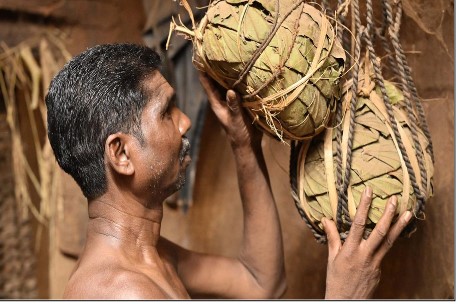Context:
The Muria tribes’ unique, traditional, and eco-friendly seed preservation technique is known as ‘Deda’.
Key Highlights:
- Muria tribal farmers in Chukkalapadu, located in Alluri Sitharama Raju district continues to practice the traditional seed preservation method known as ‘deda‘, passed down through generations.
- Deda Method: This method involves preserving seeds in leaves, packing them almost airtight to resemble boulders, and weaving them with Siali leaf (Bauhinia vahlii), locally known as ‘addakulu,’ to make the deda.
Multi-Layer Protection: The deda process includes three layers.
- First, wood ash is spread inside the Siali leaves.
- Next, the ash is covered with lemon leaves to form a casing.
- Finally, the seeds are placed inside the casing and sealed.
- Each deda can support up to 5kg of seeds and protects them from pests and worms, allowing for preservation for up to five years.
- Migration and Adaptation: Muria tribes, originally from Chhattisgarh, have migrated to the Godavari valley in Andhra Pradesh.
- Despite displacement, they continue their traditional practices like the deda method, ensuring food security for their families.
- Small-Scale Agriculture: The Murias generally cultivate mixed crops on small-scale holdings of less than half an acre.
- Their main crops are maize and pulses, with minimal reliance on paddy.
About Muria Tribe
- The Muria are an indigenous Adivasi community and a Scheduled Tribe from the Bastar district of Chhattisgarh. They are a subgroup of the Gondi people.
- Geographical distribution: The Muria tribe resides across the states of Telangana, Andhra Pradesh, Chhattisgarh, and Odisha.
- Muria settlements are identified as habitations of Internally Displaced People (IDPs).
- In Andhra Pradesh, their population totals around 6,600 and they are locally referred to as ‘Gutti Koyas’ by native tribes.
- Muria tribals fled from Chhattisgarh during the conflict between left-wing extremists and State-sponsored Salwa Judum and settled in the reserve forests of Andhra Pradesh.
- Language: They communicate in Koya, a Dravidian language.
- In Chhattisgarh, the Gutti Koyas hold Scheduled Tribe (ST) status.
- However, ST status has not been extended to them in states where they have migrated, such as Andhra Pradesh and Telangana.
- They have a progressive outlook on marriage and life in general. The Ghotul, a communal dormitory, exemplifies this by providing a space for Muria youth to explore and understand their sexuality.

